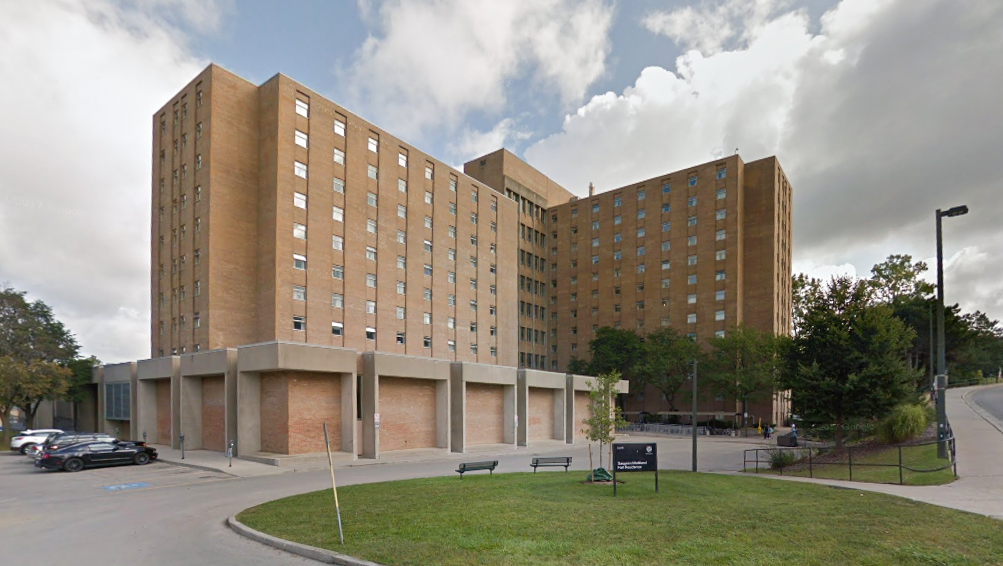As local health officials continue their contact tracing efforts, the region’s medical officer of health is hopeful that a coronavirus outbreak declared Thursday at a Western University student residence won’t impact the broader community, similarly to a separate on-campus outbreak early last month.

The latest outbreak, reported at Saugeen-Maitland Hall, the university’s largest residence, has left at least eight people infected, all of whom are now in quarantine, along with some close contacts, with the support of university brass.
Dozens of tests remain outstanding as part of the health unit’s investigation into the outbreak, and the health unit hopes it will get those results back Friday or Saturday, said Dr. Chris Mackie. An update will likely be issued Monday.
“You’re seeing outbreaks in college dorms across North America, tens of thousands of cases. We’re lucky to have just had two relatively small outbreaks in dorms at Western, so that’s a positive,” he said.
The Saugeen-Maitland outbreak comes just over a month after a separate outbreak was declared on Oct. 11 at Western’s London Hall residence, which had infected at least six people by the time it was deemed over on Nov. 10.
No outbreaks have been reported at residences at Fanshawe College.
“The other real positive is that the students that we’ve interviewed have not been indicating that they’ve had a lot of contact with anyone off-campus, so hopefully this is something that can be confined to the twentysomethings that are a relatively low-risk population,” Mackie said.
Health unit figures show that people under the age of 30 have accounted for roughly half of the at least 294 cases reported in London and Middlesex since the beginning of November.
People in their 20s in particular account for the largest number of cases overall during the entire pandemic, recording 368, or about a quarter of the region’s entire caseload.
While the cohort is considered lower-risk in comparison to older age groups, the potential long-term health consequences of the virus are still less understood.
Some patients who recover from COVID-19 have been found with lingering lung, heart or other organ damage, and preliminary data from a new study in Britain found that some young, previously healthy individuals dealing with ongoing symptoms of COVID-19 have, four months later, shown impairments in one or more organs.

The majority of residents involved in the Saugeen-Maitland outbreak were located on one floor, “but there have been multiple floors affected,” Mackie said.
He noted that on-campus activity has been well-controlled thanks to policies the university has enacted, in addition to enforcement at student dorms and in other on-campus buildings.

Get weekly health news
“That’s been really helpful,” he said. “It is really the off-campus large parties and gatherings in various venues that have been the contributors to this sort of super spreader event.”
Western officials have said they are supporting those who have tested positive in the outbreak with transportation, meals, access to medical and mental health support, and academic accommodations as necessary.
“We already had in place really strong protocols that allowed us to respond quickly and make sure that all of our students had the supports that they need,” said Jennie Massey, associate vice-president of student experience at Western.
“Those who tested positive, and as well some close contacts, have been moved to a quarantined location off of campus.”
Phone numbers and email addresses for services for Western students and families and for staff can be found here. Students, staff, and faculty are able to get tested at the Western Student Recreation Centre.
With the winter holidays just weeks away, Massey says the university is in talks with health officials about how best to advise students who may be planning on heading home.
“Thinking about their method of transportation, keeping their social circles very tight to their immediate household when they return, and really trying to not to be out socializing over the holiday period,” she said.
As positive news continues to emerge about coronavirus vaccines, Mackie says it’s important now to double down on safety precautions as the calendar moves further into the colder months.
“We really have a light at the end of the tunnel,” he said.
“You won’t have to keep doing this forever. Keep it up for, hopefully, just a few more months, and we’ll be through this.”
At Western University, more than 84 students have tested positive for the virus since the start of September, including the two residence outbreaks. An exact and updated total, however, is not clear.
The health unit last issued a tally of 70 on Oct. 1 after dozens of students contracted the virus during the month of September through off-campus gatherings and parties.
Of those, as many as 40 cases, some non-students, had been tied to two community outbreaks: a house party in mid-September, and “Western Student Outbreak Alpha.” The outbreaks were deemed over by the end of September.
— With files from Jacquelyn LeBel









Comments